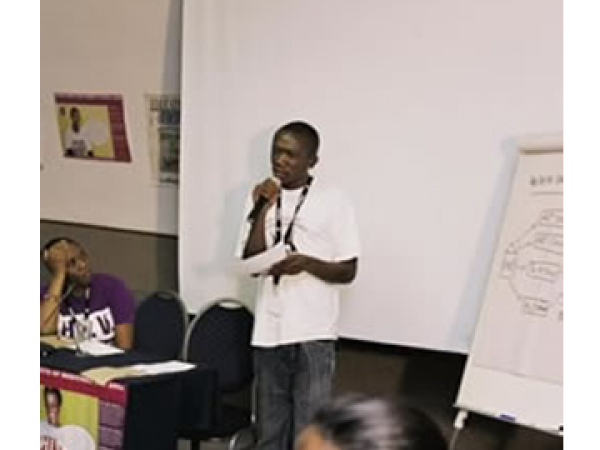Kasonokomona wins first round of court battle

Zambian activist Paul Kasonkomona has won an important first round in his court battle. In an interview on Zambian television in April he called for the recognition of gay and lesbian rights, as well as the rights of sex workers. He was arrested after the interview and charged under section 178(g) of the Zambian Penal Code.
Section 178(g) states that “every person who in any public place solicits for immoral purposes” is an idle and disorderly person and can be imprisoned for one month or fined. Kasonkomona has pleaded not guilty to the charges. His case has received wide coverage because it is seen as a litmus test of the Zambian government’s attitude to free speech and the rights of gays, lesbians and sex workers.
On Wednesday morning, 5 June, the magistrate hearing the case in the Lusaka Magistrates Court ruled that a constitutional application filed by Kasonkomona’s defence attorneys should be referred to the High Court. The High Court will need to decide whether Kasonkomona’s right to freedom of expression was violated when he was charged under section 178(g). The magistrate did not, however, find that the right to a free trial is an issue, a point also raised by Kasonkomona’s lawyers.
Kasonkomona is represented by Advocate Sunday Nkonde and Mr William Ngwira from SBN Legal Practitioners. The case is supported by the Southern Africa Litigation Centre (SALC).
Anneke Meerkotter of SALC said, “The defence is happy that the magistrate was persuaded on the main issue in the case. This case is of great importance to Zambia, since it goes to the heart of the extent to which open discussion on controversial issues is allowed in a constitutional democracy.”
A date has not been set for the High Court hearing.
In their constitutional application, the defence lawyers argued that the police’s interpretation of section 178(g) violates the right to freedom of expression, which is protected in the Zambian Constitution. They argued that section 178(g) was not designed to limit freedom of expression. They further argued that Kasonkomona’s right to a fair trial has been violated, as the defence has not been able to access the prosecution’s witness statements and evidence against Kasonkomona.
The state replied that no rights violation took place and that where the right to freedom of speech has been limited, it is justifiable on public morality grounds. The state also argued that the sections under which Kasonkomona was charged are not vague and are consistent with the values of a Christian state, where homosexuality and prostitution are not acceptable forms of behaviour.
Almost a month after Kasonkomona’s arrest, two Zambian men were arrested and faced trial on sodomy charges, also on Wednesday. They have pleaded not guilty in the Magistrates Court in Kapiri Mposhi (about 211km north of Lusaka). The accused appeared in a crowded magistrates court in Kapiri Mposhi. The state indicated that they were not prepared to start the case and the matter was postponed to 10 and 11 June 2013 for trial. Members of the local community who came to witness the case at court were supportive of the accused, a change from what happened at their previous court appearance. Conviction for sodomy in Zambia carries a maximum penalty of 14 years imprisonment. The accused were also represented by Advocate Nkonde.
International concerns have been raised at what is perceived to be a growing homophobic climate in Zambia. The Zambian Minister of Home Affairs, Edgar Lungu, was recently quoted in media outlets telling journalists, “those advocating gay rights should go to hell, that is not an issue that we will tolerate”. Media reports have speculated that the Zambian government is under pressure from religious groups to take action against homosexuality.
Zambia is currently drafting a new Constitution. In July 2012, the Zambian Human Rights Commission (ZHRC), in a submission in response to the draft Constitution, argued that anti-discrimination clauses were too wide and would include members of the LGBTI community. The ZHRC also argued that the right to human dignity is not justiciable and is not worth including in the Constitution.
Support independent journalism
Donate using Payfast

Don't miss out on the latest news
We respect your privacy, and promise we won't spam you.
Next: Portable flush toilets: What are they and why the fuss?
Previous: Mayor and SJC clash over toilet facts

This article is licensed under a Creative Commons Attribution-NoDerivatives 4.0 International License.
